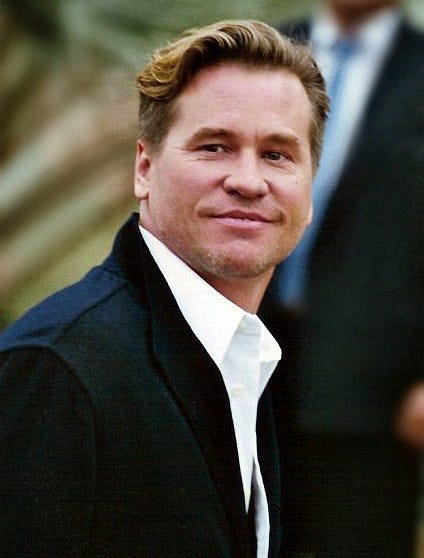Val Kilmer is gone. Sixty-five years old. The voice, the myth, the grin that could disarm you or dismantle you — gone.
You don’t need to pretend he was easy. He wasn’t. He didn’t always play the game, didn’t always say the right thing, didn’t care much for expectations. But when the camera was rolling, and the words were sharp, and the stakes were strange — there was no one better.
He didn’t just act. He cracked things open.
YES, HE WAS ICONIC
He was Iceman — all angles and ice-veins in Top Gun. He was Jim Morrison in The Doors, not playing him so much as conjuring him. He was Batman in Batman Forever, doing what he could inside a film that couldn’t decide what it wanted to be. He was Doc Holliday in Tombstone, a performance so singular it eclipsed the genre itself. And in Heat, he went toe-to-toe with De Niro and Pacino, holding the center of gravity without raising his voice.
Those roles made him famous. But they didn’t define him.
CITIZEN TWAIN: THE FIGHT TO BE HEARD
When his body failed him and his voice was nearly gone, he found a new one. Citizen Twain was Kilmer’s one-man play, and later a film (Cinema Twain), in which he channeled Mark Twain not to entertain but to interrogate: race, religion, morality, legacy — all of it laid bare under a mustache and a monologue.
He wasn’t asking for approval. He was asking better questions.
It wasn’t glossy. It wasn’t easy to watch. It was honest. And that made it matter.
THE FILMS THAT GOT LOST — BUT SHOULDN’T HAVE
In The Salton Sea, he played a jazz trumpeter drowning in grief and meth. In Wonderland, he embodied the crumbling remains of John Holmes with a hollow desperation. In Felon, he became a lifer in a concrete tomb, inked head to toe, resigned but still dangerous.
In Twixt, he stumbled through a ghost story built on regret. In Blind Horizon, he chased his own past across a dusty desert. In Song to Song, he revved a chainsaw at a concert and vanished like a fever dream.
These weren’t hits. But they were full of truth. Full of Kilmer.
TRUE ROMANCE: A GHOST IN THE MIRROR
In True Romance, he’s not even credited. You barely see his face. But there he is — a shadow of Elvis whispering from the bathroom mirror, egging on a killer with a smile and a voice like prophecy.
He didn’t need to be seen. He only needed to be heard.
THUNDERHEART: WHEN HE STOPPED TALKING AND STARTED LISTENING
Kilmer wasn’t always loud. Sometimes, he let the silence do the work.
In Thunderheart (1992), he played Ray Levoi — an FBI agent sent to a South Dakota reservation to investigate a murder. Half-Sioux by blood, government-issued by mindset, Levoi arrives cocky, ignorant, and desperate to prove he belongs to the Bureau, not the people he’s supposed to understand.
The film is fiction. The politics are not.
What follows isn’t a white savior arc — it’s a quiet humiliation. Kilmer plays a man forced to watch the cracks form under his badge. He doesn’t give speeches. He listens. He absorbs the rot. He learns, slowly, that being half-Native doesn’t mean anything if you’re siding with the people kicking down doors.
By the end, he’s not a hero. Just someone who finally sees the shape of the system he’s working for — and chooses to walk away from it.
Kilmer doesn’t oversell the transformation. He just strips the character down, layer by layer, until there’s nothing left but the truth.
It’s one of his most grounded performances. And one of his most important.
REAL GENIUS: THE BLUEPRINT FOR REBELLION
And before all of that — before the costumes and the collapse and the comebacks — there was Real Genius.
Chris Knight, the smartest guy in the room and the least interested in proving it. A laser physicist in bunny slippers. A saboteur of systems. A man who could weaponize humor better than any machine.
Knight wasn’t there to follow orders. He was there to break the equation. He disrupted military contracts with pool parties, demolished egos with dry wit, and pulled off high-level pranks with lab precision. He taught Mitch how to think for himself. He taught a generation of weird kids that brilliance didn’t have to come in a suit. And when the government tried to weaponize their invention, Knight turned it into an act of absurd resistance — reprogramming the laser to vaporize a giant bag of popcorn and explode their professor’s house.
That was how Chris Knight fought: with science, with mischief, and with a smile that said you never saw it coming.
And then — in the quiet moments, the ones you don’t notice the first time — he dropped the lines that linger. One of them happens while staring into space, musing on failure, success, and the weird little miracle of self-awareness:
“I was thinking of the immortal words of Socrates, who said… ‘I drank what?’”
It’s a throwaway line. A perfect one.
It says: None of us know what we’re doing.
It says: Even the greats got it wrong.
It says: If you’re going down, at least be clever about it.
That was Kilmer’s gift. To hide a philosophy inside a punchline. To make you laugh — and then wonder if maybe that was the truth, hiding in the joke.
We’re all standing here now, watching the credits roll, trying to figure out what just happened. What he meant. What we missed. What we took for granted.
This post has been syndicated from Closer to the Edge, where it was published under this address.

